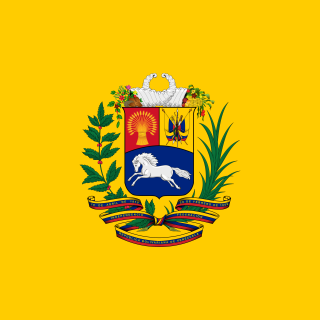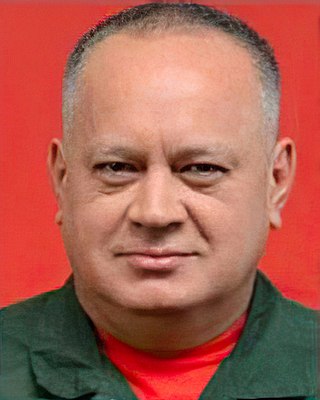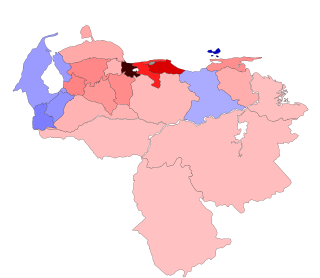
The Fifth Republic Movement was a socialist political party in Venezuela. It was founded in July 1997, following a national congress of the Revolutionary Bolivarian Movement-200, to support the candidacy of Hugo Chávez, the former President of Venezuela, in the 1998 presidential election. The "Fifth Republic" refers to the fact that in 1997 the Republic of Venezuela was the fourth in Venezuelan history, and the Movement aimed to re-found the Republic through a constituent assembly. Following Chávez' 1998 election victory, this took place in 1999, leading to the 1999 Constitution of Venezuela.

The National Electoral Council is one of the five branches of government of the Bolivarian Republic of Venezuela that was designed to be independent. It is the institution that has the responsibility of overseeing and guaranteeing the transparency of all elections and referendums in Venezuela at the local, regional, and national levels. The creation of the CNE was ratified in Venezuela's 1999 constitutional referendum. Following the election of Nicolás Maduro – Hugo Chávez's handpicked successor – into the presidency, the CNE has been described as being pro-Maduro.

The National Assembly is the legislature for Venezuela that was first elected in 2000. It is a unicameral body made up of a variable number of members, who were elected by a "universal, direct, personal, and secret" vote partly by direct election in state-based voting districts, and partly on a state-based party-list proportional representation system. The number of seats is constant, each state and the Capital district elected three representatives plus the result of dividing the state population by 1.1% of the total population of the country. Three seats are reserved for representatives of Venezuela's indigenous peoples and elected separately by all citizens, not just those with indigenous backgrounds. For the 2010 to 2015 the number of seats was 165. All deputies serve five-year terms. The National Assembly meets in the Federal Legislative Palace in Venezuela's capital, Caracas.

The Supreme Justice Tribunal is the highest court of law in the Bolivarian Republic of Venezuela and is the head of the judicial branch. As the independence of the Venezuelan judiciary under the regime of Nicolás Maduro is questioned, there have recently been many disputes as to whether this court is legitimate.

Elections in Venezuela are held at a national level for the President of Venezuela as head of state and head of government, and for a unicameral legislature. The President of Venezuela is elected for a six-year term by direct election plurality voting, and is eligible for re-election. The National Assembly (Asamblea Nacional) has 277 members (diputados), elected for five-year terms using a mixed-member majoritarian representation system. Elections also take place at state level and local level.

Democratic Action is a Venezuelan social democratic and centre-left political party established in 1941. The party played an important role in the early years of Venezuelan democracy, leading the government during Venezuela's first democratic period (1945–1948). A decade of dictatorship under Marcos Pérez Jiménez followed, which saw AD excluded from power. With the advent of democracy in 1958, four Presidents of Venezuela came from Acción Democrática from the 1950s to the 1990s during the two-party period with COPEI.

The Cabinet of Ministers of Venezuela (Spanish: Gabinete de Ministros de Venezuela is one of the bodies that make up the Venezuelan executive in that country's presidential system, alongside the Council of Ministers. The Cabinet is headed by the president of Venezuela, and his corresponding vice president. The purpose of the ministries is to create, adopt, follow and evaluate policies, strategies, programs and projects in accordance with the constitution and the laws of the republic.

The president of Venezuela, officially known as the President of the Bolivarian Republic of Venezuela, is the head of state and head of government in Venezuela. The president leads the National Executive of the Venezuelan government and is the commander-in-chief of the National Bolivarian Armed Forces. Presidential terms were set at six years with the adoption of the 1999 Constitution of Venezuela, and presidential term limits were removed in 2009.

The United Socialist Party of Venezuela is a left-wing to far-left socialist political party which has been the ruling party of Venezuela since 2007. It was formed from a merger of some of the political and social forces that support the Bolivarian Revolution led by President Hugo Chávez.

The 2010 parliamentary election in Venezuela took place on 26 September 2010 to elect the 165 deputies to the National Assembly. Venezuelan opposition parties, which had boycotted the previous election thus allowing the governing Fifth Republic Movement (MVR) to gain a two-thirds super majority, participated in the election through the Coalition for Democratic Unity (MUD). In 2007 the Fifth Republic Movement dissolved and the United Socialist Party of Venezuela was formed as the leading government party. Nationally, the popular vote was split equally between PSUV and MUD, but PSUV won a majority of the first-past-the-post seats and consequently retained a substantial majority in the Assembly, although falling short of both two-thirds and three-fifths super majority marks.

The Constituent National Assembly or ANC was a constitutional convention held in Venezuela in 1999 to draft a new Constitution of Venezuela, but the assembly also gave itself the role of a supreme power above all the existing institutions in the republic. The Assembly was endorsed by a referendum in April 1999 which enabled Constituent Assembly elections in July 1999. Three seats were reserved for indigenous delegates in the 131-member constitutional assembly, and two additional indigenous delegates won unreserved seats in the assembly elections.

The Democratic Unity Roundtable was a catch-all electoral coalition of Venezuelan political parties formed in January 2008 to unify the opposition to President Hugo Chávez's United Socialist Party of Venezuela in the 2010 Venezuelan parliamentary election. A previous opposition umbrella group, the Coordinadora Democrática, had collapsed after the failure of the 2004 Venezuelan recall referendum.

Indigenous people in Venezuela, Amerindians or Native Venezuelans, form about 2% of the population of Venezuela, although many Venezuelans are mixed with Indigenous ancestry. Indigenous people are concentrated in the Southern Amazon rainforest state of Amazonas, where they make up nearly 50% of the population and in the Andes of the western state of Zulia. The most numerous indigenous people, at about 200,000, is the Venezuelan part of the Wayuu people who primarily live in Zulia between Lake Maracaibo and the Colombian border. Another 100,000 or so indigenous people live in the sparsely populated southeastern states of Amazonas, Bolívar and Delta Amacuro.

Presidential elections were held in Venezuela on 14 April 2013 following the death of President Hugo Chávez on 5 March 2013. Nicolás Maduro—who had assumed the role of acting president since Chávez's death—was declared winner with a narrow victory over his opponent Henrique Capriles, the Governor of Miranda. Capriles had run in the previous election less than a year before, losing to Chávez by an 11-point margin. This time the margin of victory was much smaller, and thus became the closest presidential election of the country since the 1968 election.

Parliamentary elections were held in Venezuela on 6 December 2015 to elect the 164 deputies and three indigenous representatives of the National Assembly. They were the fourth parliamentary elections to take place after the 1999 constitution, which abolished the bicameral system in favour of a unicameral parliament, and the first to take place after the death of President Hugo Chávez. Despite predictions from the opposition of a possible last-minute cancellation, the elections took place as scheduled, with the majority of polls showing the Democratic Unity Roundtable (MUD) holding a wide lead over the ruling United Socialist Party of Venezuela (PSUV) and its wider alliance, the Great Patriotic Pole (GPP).

Regional elections were held in Venezuela on 15 October 2017 to elect the executive position of all 23 federal entities. This marked the first state executive election not held on the same date as elections for state legislatures, and the second separate from municipal elections. They were the 9th regional elections held in Venezuela since 1989.

Freddy Guevara is a Venezuelan politician. He was elected deputy to the Venezuelan National Assembly for Circuit 2 of the Miranda State representing the Democratic Unity Roundtable in the parliamentary elections of December 6, 2015. He has been a key figure of the opposition to Nicolás Maduro, Guevara was arrested in July 2021 charged with crimes against the state. The United States and others condemned the arrest as politically-motivated. In mid-August, he was freed as part of negotiations between the Maduro government and the Venezuelan opposition.
Parliamentary elections were held in Venezuela on 6 December 2020. Aside from the 167 deputies of the National Assembly who are eligible to be re-elected, the new National Electoral Council president announced that the assembly would increase by 110 seats, for a total of 277 deputies to be elected.

Audencio “Leckott” Zamora is a writer, musician, journalist, cultural model and artisan of the Wichí people. He lived many years in Venezuela and currently resides in Puerto Tirol, Chaco Province. He has written several books about Wichí culture, and helped in several newspaper and scientific articles related to the rights, health and education of indigenous peoples.
















